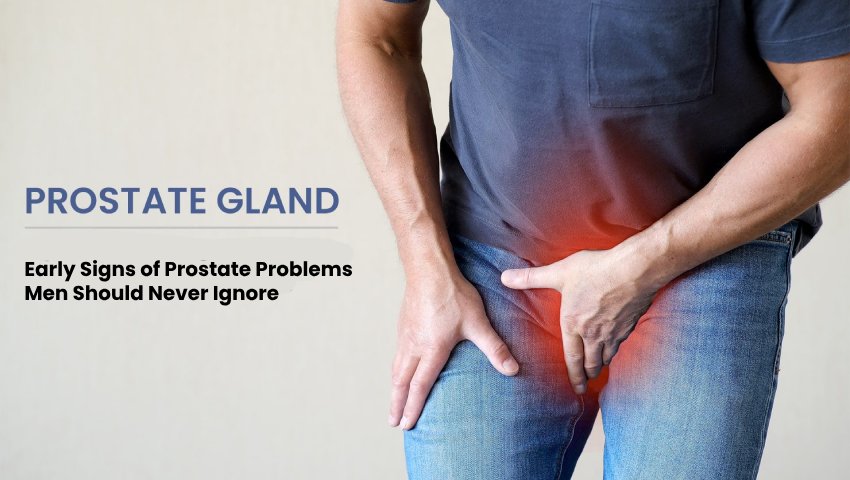
- 07/06/2025
- Leela Superspeciality Hospital
- 0 Comments
- Blogs
Early Signs of Prostate Problems Men Should Never Ignore
The prostate is a small gland located just below the bladder in men, playing an important role in the reproductive system by producing seminal fluid. As men age, the prostate gland can undergo changes that may lead to health problems. While prostate problems are common in older men, early detection can significantly improve outcomes. Unfortunately, many men tend to ignore early warning signals due to embarrassment, lack of awareness, or the assumption that symptoms are just part of aging.
At Leela Superspeciality Hospital, Dr. Akhil S Mane, a leading urologist in Pune, emphasizes the importance of paying attention to early signs of prostate trouble. Being proactive about your prostate health can lead to earlier diagnosis and less invasive treatment.
Understanding Common Prostate Conditions:
Before diving into the symptoms, it’s important to understand the common prostate conditions:
- Benign Prostatic Hyperplasia (BPH): A non-cancerous enlargement of the prostate, BPH is common in men over 50 and can cause urinary issues due to pressure on the urethra.
- Prostatitis: Inflammation or infection of the prostate gland, which can occur at any age and often causes pain and urinary problems.
- Prostate Cancer: One of the most common cancers in men, particularly those over 60. It usually develops slowly but can be aggressive in some cases.
Early Warning Signs You Should Never Ignore:
- Frequent Urination, Especially at Night (Nocturia): Waking up multiple times at night to urinate is not just an inconvenience — it can be a symptom of an enlarged prostate (BPH) or even prostate cancer. While infrequent nighttime urination may not be alarming, even patterns deserve medical attention.
- Difficulty Starting Urination: A weak or hesitant urinary stream can indicate that the prostate is pressing against the urethra. This is one of the hallmark symptoms of BPH but can also signal other severe conditions like prostate cancer.
- Weak Urine Flow or Dribbling: Men often dismiss a weak stream or post-urination dribbling as normal aging. However, these can be symptoms that the prostate is obstructing the urinary pathway.
- Incomplete Emptying of the Bladder: Feeling like your bladder isn’t fully emptied even after urinating is another classic sign of prostate enlargement. Left untreated, this can lead to urinary tract infections or bladder stones.
- Blood in Urine or Semen: Any blood in your urine or semen should be considered a red flag. It may signify infection, inflammation, or in rare cases, prostate cancer. Immediate consultation is crucial.
- Pain or Burning During Urination (Dysuria): Painful urination is typically a symptom of prostatitis (prostate inflammation or infection), but it could also result from more severe conditions. This symptom should never be overlooked.
- Pain in the Lower Back, Hips, or Pelvis: Unexplained and persistent pain in these areas can be an early indication of prostate cancer, especially if it’s accompanied by urinary issues.
- Erectile Dysfunction or Painful Ejaculation: While erectile dysfunction can have multiple causes, it is also linked with prostate problems. Painful ejaculation is often seen in prostatitis.
- Sudden Urgency to Urinate: A strong, sudden urge to urinate that’s challenging to control may signal an overactive bladder due to prostate irritation or blockage.
When to See a Urologist?
If you’re experiencing any of the above symptoms — even mildly — it’s important to consult a urologist. Routine prostate check-ups are especially important for:
- Men over 50
- Men with a family history of prostate cancer
- Men experiencing recurrent urinary tract infections
- Men with a history of sexually transmitted infections
Dr. Akhil S Mane at Leela Superspeciality Hospital uses advanced diagnostic tools such as digital rectal exams (DRE), PSA (Prostate-Specific Antigen) blood tests, ultrasound, and MRI to assess prostate health and create personalized treatment plans.
Proactive Steps for Prostate Health:
While some prostate issues are inevitable with age, you can take steps to support your prostate health:
- Regular Screenings: Start annual prostate check-ups after age 50, or earlier if there’s a family history of prostate issues.
- Healthy Diet: Include foods rich in antioxidants, omega-3 fatty acids, and zinc. Tomatoes (rich in lycopene), pumpkin seeds, and green tea may benefit prostate health.
- Stay Hydrated: Drink plenty of water, but decrease fluid intake close to bedtime to avoid nocturia.
- Exercise Regularly: Physical activity helps lower the risk of BPH and supports hormone balance.
- Limit Alcohol and Caffeine: These can irritate the bladder and worsen urinary symptoms.
- Avoid Holding Urine: Empty your bladder regularly to avoid urinary retention.
Conclusion:
Ignoring prostate symptoms can lead to complications that impact your health and lifestyle. As Dr. Akhil S Mane stresses, “When it comes to prostate health, early attention can save you from years of discomfort and serious disease.”
If you’re experiencing any unusual urinary or reproductive symptoms, don’t wait. Book a consultation with Dr. Akhil S Mane at Leela Superspeciality Hospital. With a commitment to excellence and patient-centered care, Dr. Mane and his team are here to guide you toward a healthier future.

